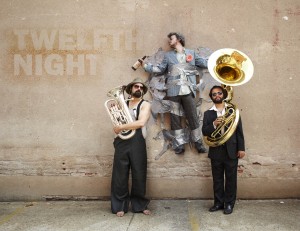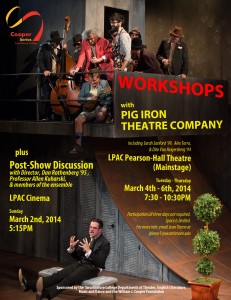Monthly Archives: February 2014
Ballet at Swarthmore
A spotlight on Rachel Fresques ’14 and dance at Swarthmore:
Ballet at Swarthmore
A spotlight on Rachel Fresques ’14 and dance at Swarthmore:
Three Musketeers recap – in case you missed it!
From the Phoenix:
http://www.swarthmorephoenix.com/2014/02/20/gender-bending-swashbuckling-comedy-a-must-see/
and from the Daily Gazette:
(pictures 7, 8, 9 by Martin Froger-Silva ’16).
Cooper presents Pig Iron’s TWELFTH NIGHT (3/1 – 3/2)
 The Swarthmore College Department of Theater and the William J. Cooper Foundation will present Pig Iron Theatre Company’s Twelfth Night, or What You Will. Start with a shipwreck, take one part mistaken identity, add in a comedic love triangle and mix with excessive drinking, melodramatic breakdowns and a live, Balkan-inspired musical score, and you’ve got a raucous take on one of Shakespeare’s most wicked comedies. Alternately absurd and heartfelt, Twelfth Night, or What You Will is replete with practical jokes, gender confusion, and thwarted love. This event is free and open to the public without reservation, but seating will be limited.
The Swarthmore College Department of Theater and the William J. Cooper Foundation will present Pig Iron Theatre Company’s Twelfth Night, or What You Will. Start with a shipwreck, take one part mistaken identity, add in a comedic love triangle and mix with excessive drinking, melodramatic breakdowns and a live, Balkan-inspired musical score, and you’ve got a raucous take on one of Shakespeare’s most wicked comedies. Alternately absurd and heartfelt, Twelfth Night, or What You Will is replete with practical jokes, gender confusion, and thwarted love. This event is free and open to the public without reservation, but seating will be limited.
Director Dan Rothenberg ‘95 says that, “After 15 years of making original performance experiments, the next hurdle was to see if [Pig Iron] could apply our physical ensemble approach to a classic script and let everything we care about live within a very set form. Experimental theater is about opening up new ways of seeing; could we sneak this into a Shakespeare play without deconstructing the thing? All our experiments with clown theater, with cabaret, and with dance theater inform the way people speak and move in this production, resulting in a rough, wholly American Twelfth Night.”
With their signature verve, Pig Iron turns Shakespeare’s text into a clear, funny, and vibrant performance in this award-winning and music-soaked crowd-pleaser. There are dueling musicians, depressive noblemen, idiots and veteran jesters, religious zealots, and erotic misunderstandings. With its highly physical performance style, Pig Iron brings a news spark to one of Shakespeare’s most celebrated plays.
Pig Iron’s production features company regulars James Sugg (OBIE Award winner for Chekhov Lizardbrain), Dito van Reigersberg ‘94, and Alex Torra, Birgit Huppuch (Pig Iron’s Isabella, OBIE Award winner for Telephone) as Olivia, and Kirsten Sieh (GATZ) as Viola. Barrymore Award-winning New Zealand composer Rosie Langabeer has provided a musical score performed live by members of the West Philadelphia Orchestra. Twelfth Night premiered at the 2011 Philadelphia LiveArts Festival, was recently revived for Philadelphia’s 2013 FringeArts Festival, and recently experienced outstanding success at the Abron Arts Center in New York.
These events are free and open to the public without reservation, but space is limited.
Where: LPAC Pearson-Hall Theatre
When: Saturday, March 1st at 7PM and Sunday, March 2nd at 2PM and 7PM
Additional events:
Join Director, Dan Rothenberg ’95, Professor Allen Kuharski, and members of the TWELFTH NIGHT cast for a post-show discussion on Sunday, March 2nd at 5:15pM in the LPAC CINEMA.
Join Alumni Sarah Sanford ’99, Dito van Reigersberg, and Asst. Professor Alex Torra for Workshops on Pig Iron’s performance technique: Tuesday through Thursday, March 4th – 6th, 7:30-10:30PM. Attendance all three nights not required, but space is limited. Contact Jean Tierno (jtierno1) or Allen Kuharski (akuhars1) for more information.
Meet Eben Weitzman ’84 Conflict Resolution Professor and Consider Graduate Study
It was great to have the opportunity to meet Eben Weitzman ’84 at the Peace and Justice Studies Association meetings at Tufts University during the fall 2012 semester. Prof. Weitzman was sharing information at the meetings about programs in conflict resolution at the University of Massachusetts, where he teaches.
He has kindly written a blog post about his Swarthmore experience and his career in conflict resolution studies:
————————————————–
- You have to hold yourself to high standards.
- You have to subject your work to rigorous test, whether it’s empirical research or practice in the field.
- You have to be willing to accept answers you don’t like.

The program is designed to provide students with the ability to understand, effectively manage, and intervene in conflict situations that arise among individuals and groups, locally and globally. Students explore the causes, dynamics, and consequences of conflict in a variety of settings; they learn techniques of conflict analysis and resolution, problem solving, and collaborative decision making; and develop skills in negotiation, mediation, dialogue and facilitation.
Students come to our programs from six continents and more than thirty countries, bringing a wide range of backgrounds and a rich diversity of experience. Some are midcareer, while others arrive directly from undergraduate degree programs.
We have 2 current Fulbrights studying with us from abroad, and 8 new Fulbright applicants for the Fall!
Alumni of our programs are doing exciting and important things in a variety of settings; examples include:
Direct mediation services
United Nations ; World Bank
Superior Court of the District of Columbia
Metro-West Community Mediation
Ombuds offices
Princeton and Cornell Universities
National Institutes of Health
American Red Cross
Business and Non-Profits
eBay and PayPal (online dispute resolution)
Human Resources, Harvard Pilgrim Health Care
Mass General Hospital
Advocacy for Refugee & Immigrant Services for Empowerment
Ministry of Energy, Nigeria
Our beautiful campus on Boston Harbor offers our diverse student population both an intimate learning environment and the rich experience of a great American city.
I would love to hear from Swarthmore students looking for graduate study in conflict resolution, or even just curious to learn more about the field. Another good contact is our Associate Director, Roni Lipton roni.lipton (at) umb.edu
Please note that our deadline is fast approaching: it’s March 15!! If you are interested but may not be able to get things together by the deadline, please reach out to me directly and we’ll work with you.
Please also consider joining us in April for a 2-day symposium on Bridging Global Religious Divides, and consider submitting a paper for next October’s 10th Biennial Student Conference: “Conflict Studies: The Next Generation of Ideas.
I look forward to hearing from you!
Contact Information:
Eben A. Weitzman, Ph.D.
eben.weitzman (at) umb.edu
617-287-7238
Post-show discussion and workshops with Pig Iron (3/2, 3/4-3/6)
In addition to TWELFTH NIGHT, Pig Iron will be joining us for some other events. Check it out! 
Join Director, Dan Rothenberg ’95, Professor Allen Kuharski, and members of the TWELFTH NIGHT cast for a post-show discussion on Sunday, March 2nd at 5:15pM in the LPAC CINEMA.
Join Alumni Sarah Sanford ’99, Dito van Reigersberg ’94, and Asst. Professor Alex Torra for Workshops on Pig Iron’s performance technique: Tuesday through Thursday, March 4th – 6th, 7:30-10:30PM. Attendance at all three workshops not required, but space is limited. Contact Jean Tierno (jtierno1) or Allen Kuharski (akuhars1) for more information.
Mary Walton to speak about Alice Paul at Swarthmore Friends Meeting
Swarthmore Friends Meeting is pleased to announce:
Mary Walton, author of A Woman’s Crusade: Alice Paul and the Battle for the Ballot, will speak at Swarthmore Friends Meeting, this Sunday, February 23, at 11:45 in Whittier Room. Alice Paul was a leader of the women’s suffrage movement during 1913-1920, and a New Jersey Quaker in a lineage of women Quaker activists. She was also a pioneer of nonviolent resistance. She is compared to Gandhi and Martin Luther King, in terms of her vision for and leadership of the women’s suffrage movement. Through nonviolent direct action, she and her followers spurred a recalcitrant Congress and President to approve the Nineteenth Amendment to the Constitution, giving women the right to vote. Join us as we learn more about the struggles and sufferings of those involved in this movement from Mary Walton this Sunday. Mary Walton is author of four books, a former reporter for the Philadelphia Inquirer, and a community organizer.
Highlights from the Phoenix
Swift’s Playwriting thesis gets kudos in the Phoenix:
We’re looking to hearing more about this play in the future!
Rutgers Conference Commemorates Community Organizing in the Modern Civil Rights Movement
The determined grassroots efforts of individuals who drove the struggle for Civil Rights during the 1960s will be explored at the 2014 Marion Thompson Wright Lecture Series, Tending the Light: Community Organizing and the Modern Civil Rights Movement, Saturday, Feb. 15, 2014, at the Paul Robeson Campus Center, 350 Dr. Martin Luther King Jr. Blvd., on Rutgers University’s Newark Campus, from 9:30 a.m. to 3 p.m.

(Photo by Danny Lyon
Mississippi, 1963: Martha Prescod, Mike Miller, and Robert Parris Moses doing voter registration work in the countryside. Moses is one of the MTW speakers in February.)
Immediately following the MTW conference, the audience is invited to attend a free reception at the Newark Museum, 49 Washington St., which also features live musical entertainment by The Bradford Hayes Trio. Both the MTW conference and museum reception are free and open to the public.
The lecture series was co-founded in 1981 by Dr. Clement Price, Board of Governors Distinguished Service Professor of History at Rutgers University, and the late Giles R. Wright, New Jersey Historical Commission. Over the past 33 years, the conference has drawn thousands of people to the Rutgers-Newark campus and has attracted some of the nation’s foremost scholars and humanists who are experts in the field of African and African American history and culture. It has become one of the nation’s leading scholarly programs specifically devoted to enhancing the historical literacy of an intercultural community.
The annual conference was named for East Orange native Dr. Marion Thompson Wright, a pioneer in African American historiography and race relations in New Jersey, who was the first professionally trained woman historian in the United States.
The Marion Thompson Wright Lecture Series is sponsored by the Rutgers Institute on Ethnicity, Culture, and the Modern Experience; the Federated Department of History, Rutgers-Newark and the New Jersey Institute of Technology; and the New Jersey Historical Commission/Department of State. The 2014 conference receives additional support from the New Jersey Council for the Humanities, the Rutgers Committee to Advance Our Common Purposes, and the Prudential Foundation.
For additional information about the program, visit the Institute’s website at: http://ethnicity.rutgers.edu, or contact the Rutgers Institute on Ethnicity, Culture, and the Modern Experience, 973/353-3891.

